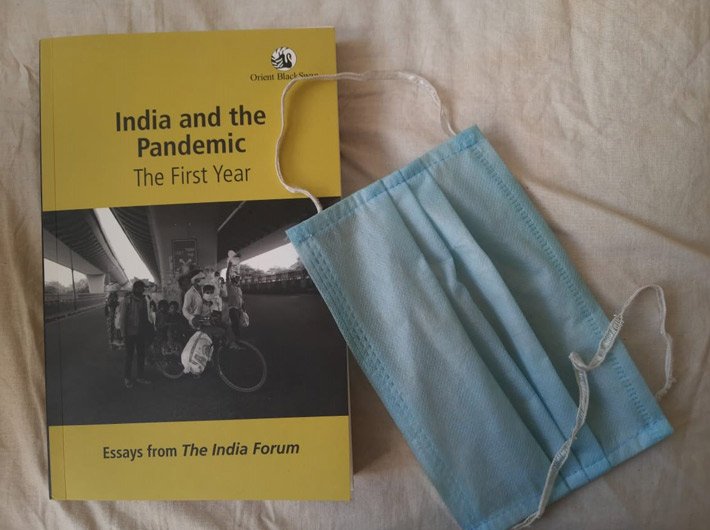Essay collection from ‘The India Forum’ chronicles the first year of India’s battle with the pandemic
India and the Pandemic: The First Year
Essay from The India Forum
Orient BlackSwan, 335 pages, Rs 695
It’s about time for the first anniversary. Just around this time last year, we were wondering about the virus. We thought it is just one of those things that come and go; our life as we know it is bound to go on. Then we read some reports and rushed to buy a sanitizer but the chemist had run out of stock. That made us wonder if we were overoptimistic or others knew something we didn’t. To be on the safe side, we started avoiding crowded places and responding to a proffered hand with folded hands. The so-called Janata curfew awoke us in shock. Within a week of that, we were living inside a dystopian science-fiction film. The nightmare continued for months, and for all we know it is still continuing.
Unlike the pandemics of the old, the last one being of 1918-20, this was one where the state was going to have a central role. For the heavy toll over a year and unimaginable suffering around the world, the state can in retrospect offer many excuses. In the face of an enemy about which little could be said with certainty back then, any action could potentially invite criticism later. Be it masks, timing and extent of lockdown or vaccination, policymakers around the world have dithered here and there or acted but realized consequences later. India is no exception.
“Looking back, it is not so much India’s inability to prevent the large number of infections in 2020 that should be cause for regret as to how the country coped with the pandemic. There was an absence of community and a lack of humanity in how both the state and society responded to Covid-19. Collectively, the people were wrenched through an enormous amount of suffering which the country, when it looks back later at the events of 2020, will not be proud of,” write Faizi Ahamad, CJ Kuncheria and C Rammanohar Reddy in the introduction, setting the tone of the collection.
As these essays – written without the benefit of hindsight and published just when the crisis was unfolding – make it clear, many more lives could have been saved, much ground could have been prepared, and man-made tragedies like the labour migration could have been averted. Former health secretary K. Sujatha Rao, for example, had written the essay, ‘Coping with the Coronavirus: Are Indians Safe?’, when the lockdown was just a day old. She argued that India’s response was tardy in the face of rising evidence and three infections by February. Her year-old suggestions today make a painful reading.
As the lockdown closed work opportunities, tens of thousands of labourers left big cities and rushed home. They walked or cycled for hundreds of kilometres under a summer sun often without food supplies. They risked infection and some succumbed too. The special train services for them came later, and so did various relief measures. But the question remains if it could not have been foreseen. For women and children sleeping on an empty stomach by the side of a highway after the day’s walk, they must have wondered if the state machinery cared for them at all. Upendra Baxi and Harsh Mander’s essays analyse some aspects of the tragedy.
Two sections analyse the impact of Covid-19 and the lockdown on the economy and the society, while the concluding section takes a larger view, with an eye on the future. The collection will be a handy ready-reckoner for researchers and concerned citizens alike for years to come.
For more: https://www.theindiaforum.in/article/india-and-pandemic-first-year
